-
PLAYING DEAD (Jean-Paul Salommé 2013)
JEAN-PAUL SALOMÉ: PLAYING DEAD/JE FAIS LE MORT (2013)
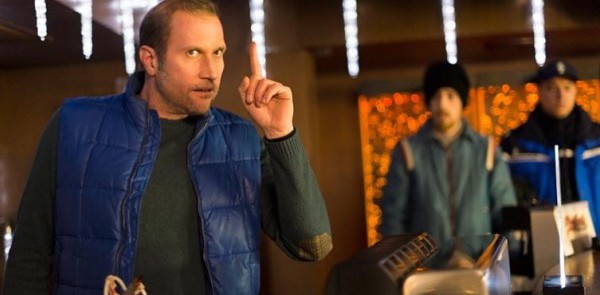
FRANÇOIS DAMIENS IN PLAYING DEAD
Contrivance
Jean-Paul Salomé's Playing Dead/Je fais le mort is a mildly entertaining but tonally uneven comedy-mystery that follows the familiar detective story device of playing musical chairs with suspects, winding up with one of the least likely ones. In the process Playing Dead piles on its wealth of scenes and plot twists that eventually turn mechanical.
The protagonist, failing actor Jean Renaut (François Damiens), is inconsistently conceived, morphing too easily from goofy loser to ace amateur detective. What is consistent is Renaut's need to interfere in the direction of his scenes, a trait that loses him a regular paycheck when he's fired at the outset from a TV cop series. Out of work and with bills to pay, he accepts a related job that, however, is only marginally "acting." He goes to the ski resort of Megève to play the victims for a police restaging of a multiple murder. Here, Renault's self destructive interference leads him to play detective when he's only mean to play victim.
Renault clashes/flirts with the "juge d'instruction" in charge, Noémie Desfontaines (Géraldine Nakache), again taking over and annoying her with his own theories about how the action went down in each murder. Of course he will turn out to be the one who is right, not her or local police lieutenant Lamy (Lucien Jean-Baptiste), winning Noémie's admiration and affection and leading to a collaboration with local innkeeper Madame Jacky (Anne Le Ny). None of this is remotely believable, and it started to feel like Damiens was becoming too much like his character -- a once promising newcomer (who a César as such early on) who's now just a hack going through the motions.
Energetic Belgian-French character actor Daniens is known for secondary roles in OSS 117: Cairo, Nest of Spies (2006), Heartbreaker (2010) and Delicacy (2011). He's in three films of the 2014 version of Lincoln Center's Rendez-Vous with French Cinema, the other two being the detective in Serge Bozon's oddbally police procedural Tip Top and the father of Sara Forestier in Katell Quillévéré's excellent crime-love melodrama Suzanne.
Jean-Paul Salomé has eight features listed on Allociné, the best received critically (3.4 press rating) being his 2008 Les Femmes de l'ombres/Female Agents, with Sophie Marceau and Julie Depardieu. He has shown a penchant for crime-mystery, with stabs at Belfagor and Arsene Lupin, but most of his films have not shown in the US or done well critically in France. The Paris-Match critic felt Playing Dead shows Salomé does better, as here, with a low-keyed low-budget film than "at the head of a superproduction." 11 December 2013 French release. A so-so Allociné press rating: 2.9. Screened for this review as part of the 6-16 March 2014 Unifrance-Film Society of Lincoln Center series Rendez-Vous with French Cinema. Public showings of the film:
Saturday, March 8, 6:00pm – BAM; Saturday, March 8, 9:00pm – WRT; Sunday, March 9, 3:15pm – IFC; Friday, March 14, 1:00pm - EBM
In Person: Jean-Paul Salomé
Last edited by Chris Knipp; 01-02-2015 at 01:10 PM.
-
SUZANNE (Katell Quillévéré 2013)--R-V
KATELL QUILLÉVÉRÉ: SUZANNE (2013)
[This review was written during the SFFS's French Cinema Now series in Nov., 2013.]
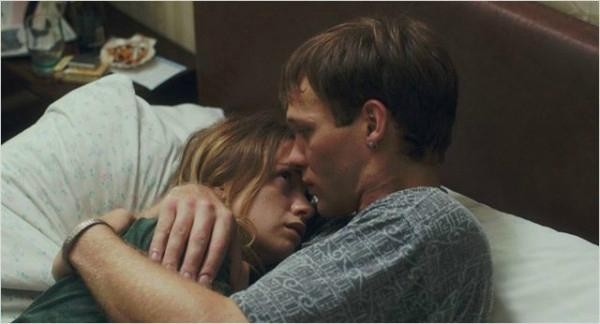
SARA FORESTIER AND PAUL HAMY IN SUZANNE
Criminal lovers
Katell Quillévéré's debut Love Like Poison (Un poison violent) (R-V 2011), a little coming of age film set in the provinces, did not really live up to its extreme title, but the director ups the ante marketly in the fast extreme story of a bad girl that is her second film, starring the frisky Saraa Forestier as the protagonist and François Damiens as her uneasy father. At Cannes when the film debuted in Critics' Week Catherine Shoard wrote in the Guardian, "The second feature from 33-year-old Katell Quillévéré [is] the sort of woozily shot, remorselessly emotional, acutely observed socio-realist soap that both confounds and confirms chick-flick prejudice." Indeed this could be seen as a crime story that due to its female point of view goes heavy on the love stuff and light on the crime stuff.
The blurb description of the film as "told in elliptical fragments that span 25 years" is misleading. Those "fragments" are simply sketches of Suzanne and her more staid sister Maria (Adèle Haenel, who was in Céline Sciamma's Water Lilies) slipping through their early years. They quickly lead us up to the key action that takes place when they are in their twenties. Suzanne has an illegitimate child, Charlie, who becomes part of the household of the girls and their widowed dad, Nicolas Merevsky (Damiens), while Suzanne works in the office of the trucking firm dad drives for. Suzanne then falls madly in love with a louche, lanky miscreant called Julien (strong newcomer Paul Hamy), disappears for a year, and then is sent to jail for burglary and assault as Julien's accomplice. Because Nicolas is out a lot, Charlie has been put into a foster home. At the court when Suzanne is sentenced, Nicolas is devastated, and rushes out.
As Catherine Shoard says, Quillévéré throws so much at you in a short time your feel manipulated. But this approach does permit her to cram a heap o' livin' into only an hour and a half. All I've described above takes place just in the first 46 minutes.
Sara Forestier is a gifted actress who's shown her ability to play a hellion before, 2010's The Names of Love being a good example. Paul Hamy has a savage look and manner that is her match and their scenes together are the most memorable in the film. In between Suzanne may just be waiting. Quillévéré used that title too soon: this is the "love like poison," a pleasing poison, evidently. Quillévéré shows here that she can make a powerful film too, though she is as overambitious this time as she was timid in the first film. Boyd van Hoeij in Variety thinks the director, her co-writer Mariette Desert and editor Thomas Marchan have trouble keeping the audience engaged or staying fully focused on the protagonist, and introduce some scenes that are incomprehensible or unnecessary. Despite the film's rush and brutal emotionalism, though, it knows how to stop and breathe too, even if sometimes it's more a gasp for breath. The sometimes documentary cinematography of Tom Harari is good at both long and very closeup shots, but is too murky at times. The acting is uniformly fine and the chemistry between Forestier and Haenel as sisters is great and between Forestier and Hamy as lovers more than great, almost scary.
Suzanne, 90 mins., debuted in Critics' Week at Cannes and opens theatrically in France 14 Dec. 2013. Screened for this film as part of the 7-10 Nov. San Francisco Film Society series French Cinema Now. Included also in the program of the Film Society of Lincoln Center-Unifrance 6-16 March 2014 series, Rendez-Vous with French Cinema. French release 18 December 2013, Allociné press rating: 4.1.
Saturday, March 8, 2:30pm – IFC; Sunday, March 9, 4:30pm – WRT; Wednesday, March 12, 4:00pm - EBM
In Person: Katell Quillévéré
Last edited by Chris Knipp; 01-02-2015 at 01:27 PM.
-
THE GILDED CAGE (Ruben Alves 2013)
RUBEN ALVES: THE GILDED CAGE/LA CAGE DORÉE (2013)
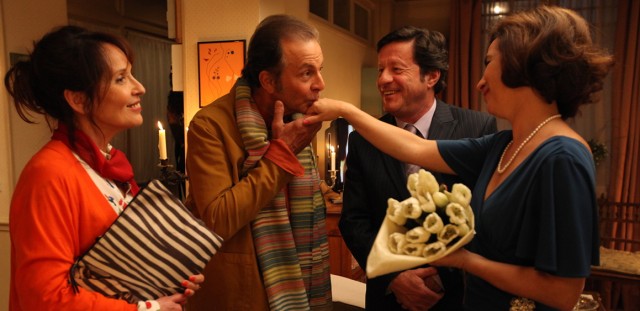
Chantal Lauby, Roland Giraud, Joaquim de Almeida, Rita Blanco
A comedy of class and nationality issues set in bourgeois Paris
The Gilded Cage/La cage dorée is a routine charmer that contains various ingredients older US arthouse audiences like. To begin with it states its movie-glossy view of its locale with romantically hazy panoramas of major Paris tourist landmarks. Its ground level focus is a nice middle-aged expatriate Portuguese couple, Maria and José Ribeiro, who have lived in Paris for some 35 years. Maria is the concierge of a posh Haussmannian building, another attractive locale, which provides her and José with a convenient if cramped ground floor apartment called the "loge." José is the foreman for a successful French building contractor. Both are indispensable to the French people they work for and serve. They begin to recognize how fulfilling and involving their roles are when news arrives of an inheritance from a family member back home involving houses and a farm producing port wine that provides an income of €200,000 a year. José, at least, has always wanted to return to a house in their native land. Here it is, and then some, an ancestral one, with a payoff. Essential condition for receiving this inheritance: the family must move back to Portugal.
The real issue is how José and Maria can resolve this conflict between their longtime ties in Paris -- intensified by the presence of their son Pedro (Alex Alves Pereira) and older daughter Paula (Barbara Cabrita), both of whom identify as essentially French -- and the rich inheritance and ideal conditions for returning home to Portugal. But instead of considering the issues involved in making a decision this serous and practical, in the manner, say, of a Jane Austen novel, Ruben Alves' film just jokes around about them for an hour or so.
The movie rushes all too eagerly to provide comic complications. Suddenly it emerges that Paula is romantically involved with the handsome Charles (Lannick Gautry), the son of José's boss Francis Caillaux (Roland Giraud) and ditsy wife Solange (Chantal Lauby).
Francis brings José to a fancy restaurant meal with entrepreneurs planning to build a shopping center and he's such a paragon of old-world craftsmanship and integrity the fat cats hire Francis on the spot to do the construction provided José's in charge. Francis also offers José a fat raise. And it turns out that the construction company has been on the skids of the past two years and if they can't take this job, which requires José's presence to sell, they're screwed. On the home front, the apartment building managers not only guarantee José and Maria can occupy the "loge" free of charge for a long time to come but will expand it, showing they're a lot nicer and more devoted to Maria than they may have seemed.
The status issues are driven home in an intentionally lighthearted but slightly gag-inducing manner when, to certify the union of Charles and Paula, their respective parents have a sit-down dinner at the "loge" full of embarrassing class comedy with Maria painfully trying to act posh and Solange Caillaux equally awkward in her straining to act down-home and her revealed ignorance of things Portuguese. The blurb's "sprawling cast of oddballs" is displayed throughout the film. Pedro in turns embarrasses himself by pretending to his lyçée girlfriend that his family is among the apartment building's rich occupants instead of mere caretakers.
La cage dorée has been nominated for a 2014 César for "best first film" and Ruben Allves has certainly delivered an able and fluent effort -- except that it is a mass of sit-com-like situations and clichés and offers nothing new. One might contrast Philippe Le Guay's recent period social comedy The Women on the Sixth Floor/Les Femmes du 6e étage about a rich financier (played by the impeccable Fabrice Lucchin) who discovers working class earthiness in 1962. This other treatment of Hispanics in Paris is quite conventional, meant only to amuse and warm the heart. But it still offers more solid matter than this fluffy effort -- which, while a bit thin on realistic detail, also isn't quite as hilarious and fun as it may intend.
La cage dorée, 90 mins, was released in Franch 24 April 2013. Critics were generally favorable, with the Allociné press rating a decent 3.5. Screened for this review as part of the Film Society of Lincoln Center-Unifrance joint 6-16 March 2014 series Rendez-Vous with French Cinema . R-V showings: Sunday, March 9, 9:30pm - WRT; Tuesday, March 11, 6:00pm – IFC; Saturday, March 15, 7:15pm - WRT.
Last edited by Chris Knipp; 01-02-2015 at 01:22 PM.
-
THE MARCHERS (Nabil Ben Yadir 2013)
NABIL BEN YADIR: THE MARCHERS /LA MARCHE (2013)

Grassroots political action in France
During the brief socialist presidency of François Mitterand and therefore a time of hope for leftists, it was known as "La Marche pour l'égalité et contre le racisme" (The March for Equality and Against Racism) and was nicknamed by the media "Marche des Beurs," using a slang word for French-born children of North African Arabs. But it was not just that, since according to this film, key members of the nine original marchers are non-Arabs, especially Claire (Charlotte Le Bon), a self-declared lesbian, Christophe Dubois (Olivier Gourmet), one of the leaders and anchors, and Sylvain (Vincent Rottiers), a young white unemployed man from the poor Minguette suburb outside Lyons, where the march begun in Marseilles got its inspiration. (Names have been changed; these are stand-ins for the originals.) The march took place from 15 October to 3 December 1983. It was the first national demonstration of its kind in France, part of a movement as much needed today as then, and largely forgotten. For director Nabil Ben Yadir clearly this is a labor of love for which he got fine support. The aim equally clearly is to entertain but also to edify and inform.
Two main demands the group formulates: a ten-year residency card and the right to vote for non-citizens. The group's conflicts about its stands are very nicely shown. All the rough edges are there.
The group goes to big cities, but while they are menaced by racists on the road, and one member is brutally disfigured, while another terrible attack takes place against a young Arab on a train, in the first town only one supporter shows up, if an enthusiastic one. But they gather numbers and get on the national news; bravely visit Dreux, a town where the ultra-right National Front had just gained electoral strengh; and when they get to Paris there is a real Paris-style march of well-wishers, 100,00 strong.
Ben Yadir does an excellent job at a task that's not so easy, dramatizing a group event that includes few dramatic events. But there is plenty of specific personal detail. It begins when charismatic young Mohamad (Tewfik Jallab) is gravely injured by a policeman. His friends want to attack the shooter, but the more useful response of non-violent action inspired by Gandhi and Martin Luther King is devised. Kheira (Lubna Azabal of Paradise Now, Incendies and Coriolanus), a tough, heavy-smoking French Arab political organizer, joins and becomes the group's voice, often provocative toward individual menbers but clear and eloquent when it's time to give a speech. A fat boy called Farid (M'Barek Belkouk), soft, obsessed by food, and not very willing to go on long walks at first, becomes a stalwart, and keeps a journal that will be one of the event's key records. Also featured is the popular Jamel Debbouze as oddball druggier marcher Hassan and Philippe Nahon as the grumpy but loyal driver of the backup van.
The march's romantic couple turns out to be Sylvain and Monia (Hafsia Herzi of Secret of the Grain) though in a late scene in the film Monia expresses doubt that their cross-cultural affair can endure. The strength of these two actors shows the depth of the casting here. The Marchers is involving, sometimes quite moving, even if it's a little long and the mise-en-scène is flat and the overall impression is of a TV movie that's way better done than you'd expect. It would have been nice to have follow up on the movement and the group, including snapshots showing the real people as they were then and are now.
The Marchers/La marche, 12- mins, Nabil Ben Yadir, France/Belgium, 2013, 120m. Released 27 November 2013 in France, the film got decent reviews (Allociné press rating: 3.4). Screened for this review as part of the Unifrance-Film Society of Lincoln Center 6-16 March 2014 series, Rendez-Vous with French Cinema. Schedule: Saturday, March 8, 9:45pm – IFC; Sunday, March 9, 1:30pm – WRT; Friday, March 14, 3:30pm - EBM
In Person: Nabil Ben Yadir
Last edited by Chris Knipp; 01-01-2015 at 07:53 PM.
-
MOOD INDIGO (Michel Gondry 2013)
MICHEL GONDRY: MOOD INDIGO/L’ÉCUME DES JOURS (2013)

ROMAIN DURIS, AUDREY TAUTOU, AND OMAR SY IN MOOD INDIGO
Overproduced surrealism
Romain Duris and Audrey Tautou, who were a cute screen couple as far back as 2002's L'Auberge Espagnole, are back again in this very oddball romance born out of marriage-made-in-heaven of novelist Boris Vian and filmmaker Michel Gondry. If you like stories in overproduced sub-Jeunet mode where every scene is replete with Rube Goldberg surrealist gadgetry, this is your movie. Otherwise, you are likely to get turned off during the first overwrought ten minutes, before the opening titles even have rolled. If surreal sequences of rows of moving typewriters and a piano that makes cocktails based on what tune's played on it float your boat, you'll find Gondry (technically anyway) in top form here, and since Vian is a writer much loved in France, this remarkable realization of his vision is particularly welcome with his local fans. Gondry's staging is rich and accomplished. It's just that it tends to overwhelm the narrative content in scene after scene.
Duris is a rich bachelor named Colin served by the big, beefy, toothy Intouchables costar Omar Sy, his accountant, major domo, and, by the way, his (at first) verbally over-polite manservant. Inspired by his best friend Chick's new American girlfriend, Colin finds Chloé (Tautou) and woos her. They marry. She becomes ill, and Colin, at first rich, goes broke because of the need to provide Chloë with an endless supply of flowers to keep her alive. I'm guessing that the novel may make a bit more use of best-friend Chick (Gad Elmaleh) than the film manages to.
Mood Indego/L'Écume des jours, 95 mins, opened in France 24 April 2013. It was nominated for three 2014 Césars -- Étienne Charry (Best Original Music), Florence Fontaine (Best Costume) and Stéphane Rozenbaum (Best Production Design). The French critical reception was mediocre: Allociné press rating: 3.0. Given Gondry's remarkable performance here and the love of Boris Vian, there were and will be admirers. But Le Monde's critic Thomas Sotinel spoke for many when he wrote, "The film exhausts all its energy in constructing a world that doesn't leave much room for its inhabitants." Or, as Variety's Boyd von Hoeij puts it, "the film frequently privileges art direction over emotion." Screened for this review as part of the Rendez-Vous with French Cinema (FSLC-Unifrance), 2014. Showings in the series:
Sunday, March 9, 7:00pm - WRT; Monday, March 10, 8:00pm – IFC; Monday, March 10, 9:30pm - BAM
In Person: Michel Gondry.
This film opens 18 July 2014 in New York at Landmark Sunshine, and in Los Angeles.
Last edited by Chris Knipp; 01-01-2015 at 01:07 PM.
-
LOVE BATTLES (Jacques Doillon 2013)
JACQUES DOILLON: LOVE BATTLES/MES SÉANCES DE LUTTE (2013)
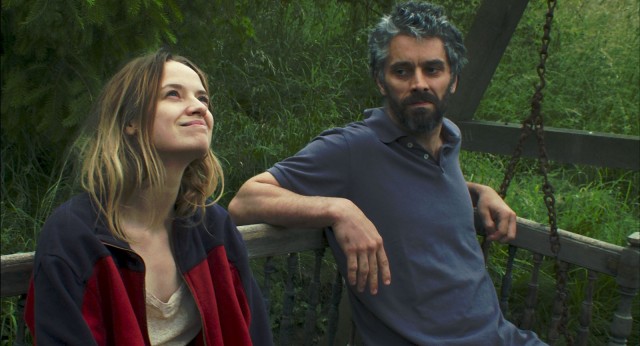
SARA FORESTIER, JAMES THIERRÉE IN LOVE BATTLES
Love smacks
On the one hand Jacque Doillon's latest is a remarkable tour de force, in physical terms. On the other hand it's barely more than teasing arthouse porn, a crude series of bump and grind sessions ending in sex as a couple decides they like S&M, or beating up on each other as a prelude to sex, anyway. This is basically a two-hander about a man and woman who can't decide if they want to fight or fuck. "She," a young country woman (Sara Forestier of The Names of Love) has lost her dad. "He" (James Thierrée, Chaplin grandson and circus acrobat) is temporary caretaker of a comfy nearby house. The pair have strong chemistry, having known each other since way back but never previously gotten it on. They do a lot of talking before the boffing starts. Then when it does, it varies only in location from scene to scene. It's outdoors and indoors, on the floor, on the kitchen table, on the stairway, in a mud puddle, and so on.
Personally, I prefer Jane Austen. If this is the modern age's version of the war between the sexes, I'll go back to Mansfield Park --or, for something French, Choderlos de Laclos. "He" and "She" are exploring sexual roles and emotional conflict in relation to eroticism, presumably. But it all seems halfway between utterly childish and utterly dysfunctional. At best, this pair needs couples therapy -- fast, before things turn outright abusive and dangerous. Unless, that is, this is just a game that goes no deeper and lasts no longer than the work of a filmmaker so glib his last movie came out just two months before this one.
Still, technically, the physical scenes are a bit unusual and seem even a bit risky (more than risqué), since it looks like the specific moves are not carefully planned and they might have hurt each other. Evidently the two performers are thoughtfully selected not just for looks but for both willingness and ability to carry out the fight-fuck transitions. Judging by her boarding a Metro train totally nude in Names of Love and other roles, such as her amour fou turn in Suzanne, Sara Forestier is a risk-taking, blithely over-the-top actress. She can hold one's attention, whatever she's doing. She is also small and light. Thiérrée, being a performance artist and acrobat as well and big and strong, is putatively capable of handling Forestier without hurting her -- though at one point late in the game he bangs her head against the wall three times. They look like they're doing damage to each other, but probably it was fairly safe. But this indeed reduces drama to performance art.
In between "She" has conversations with her sister (Louise Szpindel) at her late father's house and with a friend (Mahault Mollaret) on Skype and in person, but this dialogue is minimal and negligible, except perhaps for her helpfully telling her friend that she's madly in love with "Him" and wants nothing any more but to have sex with him. We might not have guessed. We might have thought she was prepping for kung fu class.
Love Battles/Mes séances de lutte, 99 mins., debuted at Berlin. Upon its 6 November 2013 French release it received generally favorable reviews (Doillon has a following in France) and the Allociné press rating was 3.5. Screened for this review as part of the Unifrance-Film Society of Lincoln Center 6-16 March 2014 series Rendez-Vous with French Cinema. Showings in this series:
Sunday, March 9, 7:30pm – BAM; Monday, March 10, 6:30pm – WRT; Tuesday, March 11, 8:00pm - IFC
In Person: Jacques Doillon
Last edited by Chris Knipp; 01-01-2015 at 01:08 PM.
-
LES APACHES (Thierry de Peretti 2013)
THIERRY DE PERETTI: LES APACHES (2013)
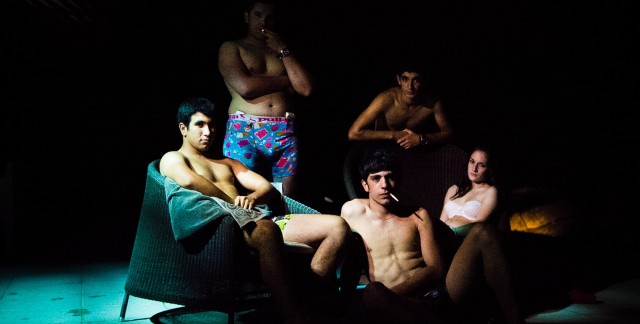
Class distinctions, raging hormones, bad decisions
The title suggests hoodlums or gypsies. Thierry de Peretti examines a local Corsican fait divers in a style that's part neorealism, part noir thriller, and all class inequality, adolescent hormones, and stupid violence. Aziz (Aziz El Hadachi) is a boy from the wrong side of the tracks of Porto-Vecchio, on the south end of the island. One night after an evening drinking and dancing in a disco Aziz takes several buddies and a girl to invade the unoccupied vacation home and pool where his father does maintenance. They swim, drink liquor, and make a mess. One, the chubby Jo (Joseph-Marie Ebrard) gets sick and throws up on the furniture. They also steal a handful of things, including a hi-fi that the Madame later says "wasn't new." The one valuable item is an antique rifle with engraved handle.
The owners of the house turn up pretty soon. When they find the damage the don't call the cops but refer to local gang boss Bati (Michel Ferracci), who traces the break-in back to Aziz and his father. Peretti is knowledgeable, astute, and subtle in his seemingly desultory examination of what the boys do, which leads up to senseless violence. Peter Debruge, chief international film critic of Variety, is not far off the mark when he writes "If Larry Clark went to the French island of Corsica and made a film, it might look an awful lot like 'Les Apaches.'” Very true. The boys are always taking their shirts off, particularly the more chiseled ones. Two of the slimmer ones are sharp dressers, one has a girlfriend who works in a hotel but is more ambitious than her boyfriend, who doesn't want her to go to Juan les Pins for a seasonal job. She says she'll get back to him when he develops some ambition, and his reply is "I'd rather be dead."
Aziz confesses to the other (minor) thefts and returns the items. François-Jo (François-Joseph Cullioli) trns out to be more interested in selling the valuable rifle as a springboard to a better life than loyalty to Aziz. What follows is a series of fumbles, and closeups of the individuals involved leading to a senseless murder.
The trouble the boys cause is minor. They return what they stole. The owners aren't much concerned. It's what the boys do to deal with the trouble that makes things much, much worse. De Peretti wisely doesn't resolve anything, which contributes to the sense of neutrality and realism. He studiously works his documentary vein -- until the end when rather than pumping up the Larry Clark sensualism, he slips into early Coen brothers territory, only to slip away again, with a final ironic tableau underlining just how close to invisible the French-Moroccan boys are to the wealthy vacation population. The irony is tinged with sadness and wisdom.
The young actors, all newcomers, are fully committed, able, and well cast. This is too modest and unwilling to resolve anything to be either a great film or a commercial one but it works its little vein of detached realism well enough to leave a haunting memory or two amid scenes that may seem too familiar. An outstanding sequence comes late when three boys are driving down a country road in a truck. Background sound is ominous and the camera, instead of coming closer, draws away, conveying a sense of events unfolding outside control or good sense.
Les Apaches, 82mins., opened at Cannes in Directors' Fortnight, May 2013, and was released theatrically in France 14 Aug. with moderately good reviews (Allociné press rating: 3.4) and it was still playing occasionally at MK2 Beaubourg in Paris in October. This is De Peretti's second feature. Screened for this review as part of the Univrance-Film Society of Lincoln Center Rendez-Vous with French Cinema for 2014 (6-16 March). Public showtimes:
Monday, March 10, 12:00pm – EBM; Tuesday, March 11, 6:30pm – WRT; Wednesday, March 12, 7:00pm - IFC
In Person: Thierry de Peretti
Last edited by Chris Knipp; 01-01-2015 at 01:02 PM.
 Posting Permissions
Posting Permissions
- You may not post new threads
- You may not post replies
- You may not post attachments
- You may not edit your posts
-
Forum Rules





 Reply With Quote
Reply With Quote






Bookmarks